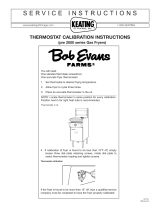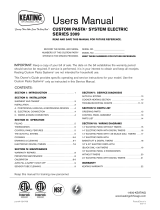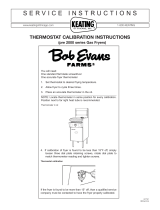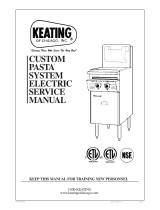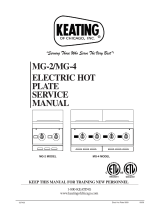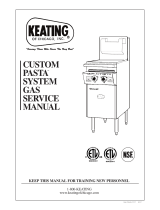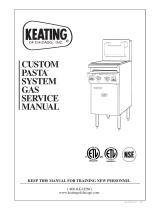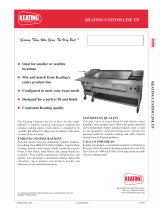Page is loading ...


WARNING
Improper installation
can cause damage,
injury or death.
ShockBurnsGas
WARNING
Do not store
flammable liquids
near this or
any other appliance.
THE EQUIPMENT IS TO BE INSTALLED TO COMPLY WITH THE BASIC PLUMBING CODE
OF THE BUILDING OFFICIALS AND CODE ADMINISTRATORS INTERNATIONAL, INC.
(BOCA) AND THE FOOD SERVICE SANITATION MANUAL OF THE FOOD AND DRUG
ADMINISTRATION (FDA).
9902091 9902091
i
Improper installation, adjustment, alteration, service or maintenance can
cause property damage, injury or death. Read the installation, operating
and maintenance instructions thoroughly before installing or servicing this
equipment.
Do not store or use gasoline or other fl ammable vapors or liquids in the
vicinity of this or any other appliance.
FOR YOUR SAFETY:
PURCHASER SHOULD POST IN A PROMINENT LOCATION.

1-800-KEATING |
ELECTRIC CUSTOM PASTA SYSTEM - SERIES 2009
Important Safety Instructions ............................................ i
INTRODUCTION .............................................................. 1
INSTALLATION
Damage During Shipment ................................................ 1
Standard Features ........................................................... 2
Model Variations ............................................................. 2
Specifi cations ............................................................ 2 - 3
Safety Precautions ..................................................... 2 - 3
FIRST STEPS .................................................................. 4
Drop-In Pasta Counter Cut-Out/Installation ........................ 3
Positioning ..................................................................... 4
Leveling .......................................................................... 4
Restraining Devices ......................................................... 4
Electrical Connection ....................................................... 4
Water and Drain Connection ........................................ 4 - 5
Setting Water Level Control Boards ................................... 5
PLACING YOUR CUSTOM PASTA IN OPERATION ............... 5
Filling ............................................................................ 5
Thermostats ............................................................. 5 - 6
Auto-Fill System .............................................................. 6
Cooking ..................................................................... 6 - 7
Draining .......................................................................... 7
Cleaning ........................................................................ 7
Electronic Timers ...................................................... 7 - 8
PREVENTATIVE MAINTENANCE ....................................... 8
Preventive Maintenance Cleaning Chart ............................ 8
Calibration ...................................................................... 9
Water Auto-Fill and Low Water Safety Shut-Off ............. 9 - 10
Warranty Repairs ........................................................... 10
Cooker Heating Section ................................................. 10
SERVICE DIAGNOSIS .................................................... 11
Troubleshooting Chart ............................................ 11 - 12
ORDERING PARTS ....................................................... 13
Service Parts Ordering ........................................... 13 - 14
WIRING DIAGRAMS ............................................... 15 - 21
Warranty Information ..................................................... 22
TABLE OF CONTENTS
INTRODUCTION
1
Instructions in this manual should be read thoroughly before attempting to operate this Keating Electric Pasta Cooker.
All installation and service on Keating equipment must be performed by qualifi ed, certifi ed, licensed and/or
authorized installation or service personnel.
Operating information for Keating equipment has been prepared for use by qualifi ed and/or
authorized personnel.
Keating equipment is made in the USA and has American sizes of hardware. All metric conversions
are approximate.
INSTALLATION INSTRUCTIONS
Proper installation will assure top performance.
Alterations of any kind to your equipment will void the
warranty. Before uncrating, check equipment carefully
for damage.
IF EQUIPMENT ARRIVES DAMAGED
Keating does not assume responsibility for loss or
damage incurred in transit.
IMPORTANT
This merchandise has been thoroughly inspected
and carefully packed before leaving our plant.
Responsibility for its safe delivery was assumed by
the carrier at the time of shipment. Claims for loss or
damage to the contents should, therefore, be made
upon the carrier, as follows:
CONCEALED LOSS OR DAMAGE
Concealed loss or damage means loss or damage
which does not become apparent until the mer-
chandise has been unpacked. The contents may be
damaged in transit due to rough handling even though
the carton may not show external damage. When the
damage is discovered upon unpacking, make a writ-
ten request for inspection by the carrier’s agent within
fi fteen days of the delivery date. Then fi le a claim with
the carrier since such damage is the carrier’s respon-
sibility. By following these instructions carefully, we
guarantee our full support of your claims to protect
you against loss from concealed damage.
VISIBLE LOSS OR DAMAGE
Any external evidence of loss or damage must be
noted on the freight bill or express receipt, and
signed by the carrier’s agent. Failure to adequately de-
scribe such external evidence of loss or damage may
result in the carrier refusing to honor a damage claim.
The form required to fi le such a claim will be supplied
by the carrier.
DO NOT RETURN DAMAGED MERCHANDISE TO
KEATING. FILE YOUR CLAIM AS STATED ABOVE.

| keatingofchicago.com
2
Keating’s Custom Pasta System is designed to give
maximum production effi ciency, delivering high qual-
ity food products. The following design features are
incorporated in Keating’s Custom Pasta System®.
STANDARD FEATURES
• Highly polished stainless steel vessel
• Highly polished stainless steel front
• Highly polished stainless steel elements
• Highly polished stainless steel thermostat bulb
• Highly polished stainless steel Hi-Limit sensor
• Grid screen over elements
• Automatic water fill with manual override
• Water solenoid and indicating light
• Starch overflow
• Two electronic timers
• Low water safety shut off
• 1" full port front drain valve on 14;
1-1/4" for 18 and larger
• High temperature limit control with manual reset
• Patented accurate temperature control system
±2°F
• Ideal 35" working height
• One pair of perforated split baskets or one
bulk basket
• Patented dual thermostat system
• Indicating lights for pilot and secondary
thermostat on
STANDARD ACCESSORIES
• Keating Klenzer Sample
• Drain clean out rod
• Sensor Cleaning Brush
STANDARD PASTA SYSTEMS
• Sizes 14 to 24
• Water capacity 5-1/2 to 24 gallons
• 14 Pasta System can cook 6 lbs. of dry pasta per
load up to 110 lbs. per hour
• ETL Certified
• ETL Sanitation Certified
• NSF Certified
MODEL VARIATIONS
Basket-Lift Model: Basket-Lift Model Pasta Systems
come with all the same features as the standard
models. The Basket-Lift mechanism lowers the
baskets of food into the water when the timer button
is pressed and raises the baskets when the cook-
ing cycle is complete. Split baskets are required for
these models.
SPECIFICATIONS
MODEL CAPACITY HEIGHT DEPTH WIDTH
14 7 gal. 46¹⁄
2"31¹⁄8"15³⁄8"
18 10 gal. 46½" 33¹⁄
8"19³⁄8"
20 17 gal. 46½" 35¹⁄
8"21³⁄8"
24 24 gal. 46½" 39¹⁄
8"25³⁄8"
MODEL kW @ 240V
AMPS
SHIP WT.
3P 1P
14 15.5 32-56-32 65 140 lbs.
18 21.4 52-52-52 89 215 lbs.
20 21.4 52-52-52 89 235 lbs.
24 28.6 79-79-52 119 285 lbs.
SAFETY PRECAUTIONS
THIS SYMBOL WARNS YOU THAT SERIOUS BURNS
OR OTHER INJURIES MAY RESULT IF SAFETY IN-
STRUCTIONS ARE NOT FOLLOWED.
• This service manual should be retained in a safe
place for future reference. The installation of your
new Pasta System must conform to local codes
and with the current National Electrical Codes
and regulations as applicable.
• Your ventilation hood, when installed, must
conform to the current ANSI/NFPA 96 standard
(latest edition).
• No frame or restriction shall be constructed
around the Pasta System that will restrict air
movement into the Pasta System’s combustion
area or prevent proper ventilation.
• You must maintain this appliance free and clear
from combustibles.
• Adequate clearance for servicing and proper
operation must be maintained. Your pasta
system is designed to be serviced from the front.
• Keating Custom Pasta™ Systems are not
intended for household use. Installation in
household voids warranty.

1-800-KEATING |
ELECTRIC CUSTOM PASTA SYSTEM - SERIES 2009
3
• ALWAYS instruct new employees on proper pasta
system operation.
• A Custom Pasta System™ should be operated
ONLY by properly trained personnel.
• ALWAYS turn pasta system off each night.
• ALWAYS turn pasta system off at customer power
panel before servicing.
• NEVER leave a pasta system unattended during
operation.
• NEVER move a pasta system when full of hot
water.
• NEVER introduce objects or liquids into pasta
system, while operational, which are not
designed or made for cooking.
• THIS CUSTOM PASTA™ SYSTEM MAY NOT BE
ALTERED, MODIFIED OR CHANGED IN ANY WAY.
IF THE EQUIPMENT IS NOT IN-
STALLED, OPERATED AND MAIN-
TAINED IN ACCORDANCE WITH
THE ABOVE, CONCENTRATIONS OF
CARBON MONOXIDE IN EXCESS
OF THE ESTABLISHED LIMITS
COULD BE PRESENT IN THE
KITCHEN ENVIRONMENT.
ALL PERSONNEL IN THE WORK
PLACE WHO MAY BE SUBJECT
TO ANY EXPOSURE OF CARBON MONOXIDE MUST
BE WARNED OF SUCH POSSIBLE EXPOSURE. THIS
WARNING SHOULD BE CONVEYED IN A MANNER SO
THAT IT IS CLEARLY UNDERSTOOD BY THE EMPLOYEE,
AND THE EMPLOYEE SHOULD BE ASKED IF IN FACT HE
OR SHE UNDERSTANDS THE CORRECT METHOD OF
OPERATION OF THE EQUIPMENT AND THAT A RISK OF
EXPOSURE EXISTS IF THE EQUIPMENT IS OPERATED
IMPROPERLY.
IF NOT INSTALLED, OPERATED AND MAINTAINED IN
ACCORDANCE WITH THE MANUFACTURER’S IN-
STRUCTIONS, THIS PRODUCT COULD EXPOSE YOU
TO SUBSTANCES IN FUEL OR IN FUEL COMBUSTION
WHICH CAN CAUSE DEATH OR SERIOUS ILLNESS
AND WHICH ARE KNOWN TO THE STATE OF CALIFOR-
NIA TO CAUSE CANCER, BIRTH DEFECTS OR OTHER
REPRODUCTIVE HARM.
IT MAY BE NECESSARY TO INSTALL A BACK FLOW
OR CHECK VALVE ON THE WATER SUPPLY LINE TO
THE PASTA COOKER. CHECK WITH EITHER YOUR
LOCAL WATER OR HEALTH DEPARTMENT TO DE-
TERMINE IF THIS IS NECESSARY IN YOUR SPECIFIC
AREA.
FIRST STEPS
DROP-IN PASTA
COUNTER CUTOUT/INSTALLATION
INSTALLATION NOTES
1. Minimum of 130 sq. in. unobstructed vent area
near pasta cooker required for combustion.
2. All Drop-In Pasta must be 16" from any open
fl ame.
3. Pasta must be located no more than 5" from
counter top front.
4. Cabinet must be reinforced to support full weight
of Pasta in use (Pasta, water, food, etc.).
5. Pasta cooker must be properly ventilated and
located under an exhaust hood.
DROPPING THE PASTA COOKER
INTO THE COUNTER TOP
It is only necessary to place the Pasta Cooker in such
a position that the front edge overlaps the front raised
edge of the opening.
Push the Pasta Cooker forward as far as it will go hold-
ing the unit on approximately a 15° angle, and then
drop the rear of the pasta cooker into its proper posi-
tion lowering it down gently so you do not deform the
table or equipment stand.
WARNING
Improper installation
can cause damage,
injury or death.
ShockBurnsGas

| keatingofchicago.com
POSITIONING
The pasta cooker must be no closer than 6" from any
combustible material. When placed under an exhaust
hood with a fi re retardant system it must comply
with ANSI/UL 507-(Latest Edition) and ANSI/NFPA
96-(Latest Edition). No frame or restriction can be
constructed around the lower part of the pasta cook-
er that would restrict ventilation or air movement into
the pasta cooker. You must insure adequate air sup-
ply to the pasta cooker. ALL connections and place-
ment must comply with local and national codes. It
is the responsibility of the owner and local installer
to comply with these regulations when installing the
Pasta System.
MINIMUM CLEARANCE
CONSTRUCTION CLEARANCES
COMBUSTIBLE NON-COMBUSTIBLE
BACK 6" 0"
RIGHT SIDE 6" 0"
LEFT SIDE 6" 0"
SUITABLE FOR NON–COMBUSTIBLE FLOORS
Adequate clearance for servicing and proper op-
eration must be maintained. Your pasta cooker is
designed to be serviced from the front. Do not place
a pasta cooker next to a deep fat fryer. Hot oil and
water can cause an unstable condition creating a
hazardous situation.
LEVELING
The Pasta System will operate at its highest effi ciency
when properly leveled. Place a level on Pasta System
vessel from side to side. For Pasta Systems on legs,
the bottom foot of the leg is adjustable. Turn counter
clockwise to increase height or clockwise to decrease
height until level. For Pasta Systems on casters, the
casters are adjustable by loosening the jam nut and
turning the caster in or out. When the desired level
is reached, tighten the jam nut. Adjustments of more
than 3/4" are not recommended on any caster. The
same procedure should be followed to level the Pasta
System from front to back.
RESTRAINING DEVICES
1. On Pasta System installations with casters, the
casters and jam nuts must be completely tightened.
Adequate means must also be
provided to limit the movement of
the appliance without depending
on the connector, the quick-dis-
connect device or its associated
piping to limit the appliance
movement.
2. Connectors must comply with
ANSI Z21.69/CAN1 CAN/CGA
6.16 (latest edition) for connec-
tors for movable gas appliances. Quick-disconnect de-
vices must comply with ANSI Z21.41/CAN 1 6.9 (or
latest edition) standard for quick-disconnect devices
for use with gas fuel as applicable.
IF DISCONNECTION OF THE RESTRAINT IS NEC-
ESSARY, IT MUST BE RECONNECTED WHEN THE
KEATING CUSTOM PASTA IS RETURNED TO ITS
ORIGINALLY INSTALLED POSITION.
ELECTRICAL CONNECTION
Your pasta cooker has been ordered in either 1 phase
or 3 phase by your dealer. All electrical connections
should be made by a licensed electrician. If neces-
sary this unit can be fi eld changed from 1 phase to 3
phase or from 3 phase to 1 phase. Have a qualifi ed
electrician refer to the wiring diagram.
ALL ELECTRICAL WIRING LEADING TO THE PAS-
TA COOKER MUST CONFORM TO LOCAL CODES.
BE SURE THE ON/OFF SWITCH IS IN THE OFF
POSITION BEFORE TURNING THE POWER ON TO
THE PASTA COOKER.
WATER AND DRAIN CONNECTION
The water is to be connected to the 3/8" female pipe
connection on the cabinet back, for auto-fi ll and the
optional faucet. Make sure this and all other con-
nections do not leak. Check your water pressure.
The auto-fi ll system is not designed to handle pres-
sure greater than 60 psi. Any pressure greater than
this can damage the auto-fi ll solenoid or cause the
system to fail. If the pressure is greater than 60 psi
a pressure regulator should be added. The water
temperature must not exceed 150°F (65.6°C). Hot or
warm water is not needed due to the instant recovery
of the Custom Pasta™ System.
4
Figure 1
Level
Caster
Leg
NOTICE
Restraining devices
required.

1-800-KEATING |
ELECTRIC CUSTOM PASTA SYSTEM - SERIES 2009
5
If during operation the boil is killed when water au-
tomatically enters the pasta cooker, turn the water
pressure down until the water is added without killing
the boil. The drain terminates within inches of the
fl oor and is designed for the standard dump to drain
opening.
In most cases the health department will not allow a
direct connection between the cooker drain and the
fl oor receptacle. Contact your local health department
for specifi c information in your area.
SETTING WATER LEVEL CONTROL BOARDS
To ensure the proper function of Keating's Custom
Pasta System, the following steps must be taken:
As water quality varies from location to location, each
new pasta cooker's automatic water fi ll board (B
board) and safety board (A board) must be adjusted
upon installation.
A or B Board
A Board Adjustment -
Keating's Custom Pasta System has a safety shut off
feature to shut down the unit automatically when the
water level becomes low. Use the following steps to
properly set this feature:
1. Fill the unit to the "FILL LINE" with water.
2. Rotate potentiometer clockwise as far as
possible.
NOTE: The potentiometer does not rotate 360°.
3. Ensure unit will heat properly (see OPERATING in
manual).
4. Slowly drain water.
NOTE: If unit does not shut down when water level is
below the lower sensor (approximately at the top of
heat tubes/elements), the following must be done:
5. Slowly rotate the potentiometer counter-clockwise
until the unit shuts down.
6. Close drain valve. Repeat steps 1, 3 and 4.
B Board Adjustment (For Auto-Fill Units only) -
Auto-fi ll units automatically replenish the pasta cooker
with water when water is absorbed in food and lost in
the form of steam. Use the following steps to properly
set this feature:
1. Fill the unit to the "FILL LINE" with water.
2. Rotate potentiometer clockwise as far as
possible.
3. Slowly drain the water until level is visibly below
the "FILL LINE".
NOTE: If the blue light does not come on and the unit
does not begin to refi ll with water, the following must
be done:
4. Slowly rotate the potentiometer counter-clockwise
until the blue light comes on.
5. Close drain valve.
6. Ensure water stops fi lling when level is at the
"FILL LINE" (a slight turn of the potentiometer
clockwise may be necessary).
OPERATING
FILLING
NOTE: Before fi lling the Pasta System make certain
the vessel is sanitized, dry and the drain valve is com-
pletely closed.
When the water fi ll toggle switch (located between
the green and blue indicating lights) is turned on, the
Pasta System vessel automatically will be fi lled to the
proper level. If the vessel is being manually fi lled with
water from a faucet or through the manual fi ll button,
fi ll to just below the overfl ow deck. The black manual
fi ll button is located to the right of the blue water fi ll
indicating light.
THERMOSTATS
The Keating pasta cooker has two thermostats. This
is to allow maximum control of the boil. The system
is designed so that both thermostats will function
together when called for but one thermostat will act as
primary and hold the water at a rolling boil during cook-
ing as well as idle time. The two thermostats allow
the user to have complete control over the cooking
process.
The right side thermostat will only activate if the left
side thermostat is active. From a cold start all ele-
ments and thermostats will be on and heat the water
to a rolling boil. Once the water has reached a rolling
boil the right side (secondary) thermostat will turn off
Figure 2
Manual Water Fill Level

| keatingofchicago.com
and the left side thermostat (primary) will hold the water
at a rolling boil. When product to be cooked is dropped
into the pasta cooker the drop in temperature depends
on the temperature spread between the two thermo-
stats as determined by the user.
If adding product does not turn on the secondary ther-
mostat and the water falls below a rolling boil, increase
the setting slightly on the secondary thermostat. It is
not recommended that there be less than a twenty
degree difference between the two thermostats. Having
less than a twenty degree difference will increase the
possibility of a boil over and cause the pasta cooker to
short cycle. The recommended starting temperatures
for the cooker are 212°F (98.8°C) for the primary and
190°F (87.8°C) for the secondary thermostat. Using
these settings with the knowledge of the operation of
this system, the user can fi ne tune the settings to fi t his
specifi c operation.
CONTROL PANEL FEATURES
Amber–shows the power is on.
Green–shows the secondary (right) thermostat
is calling for heat from the center element(s).
Blue–shows water is fi lling into the Pasta System
vessel through the Pasta System water solenoid
valve.
NOTE: The black manual water fi ll button is located to
the right of the blue indicating light.
THE AUTO-FILL SYSTEM
The water temperature must not exceed 120°F
(48.8°C). Control of the water level is fully automatic
with the auto-fi ll system. The water level is controlled by
two circuit boards attached to the two water level sen-
sors located on the front of the pot below the spash-
deck. Once the water switch is turned to ON, the pasta
cooker will start to fi ll with water. The heating elements
will not turn on until the water level is above the bot-
tom sensor. This is an automatic water safety built into
every pasta cooker. This safety prevents the pasta cook-
er from accidental heat damage due to low or no water.
The bottom sensor is the low water cut off. The top
sensor is the water level control. Both sensors should
be cleaned on a regular basis to prevent water depos-
its from interfering with the sensor reaction. Cleaning
should be done with the brush up and down the sensor
tube located on the right side of the splashdeck.
COOKING
Keating Electric Custom Pasta Systems are designed
to provide maximum production effi ciency and deliver
high quality food products. Low-temperature cooking
and highly polished stainless steel mean greater energy
savings. Two thermostats are used to provide instant
recovery and to save energy while water is boiling. The
secondary (right) thermostat calls for additional heat
at start up or occasionally when water is added. Follow
cooking procedures below for your model.
NOTE: Use of sodium chloride during the cooking pro-
cess will have a detrimental effect on the cooker tank
and will void the warranty.
• OPERATION OF THIS PASTA SYSTEM SHOULD BE
LIMITED TO PERSONNEL WHO HAVE BEEN THOR-
OUGHLY TRAINED IN OPERATING PROCEDURES.
• USE ONLY KEATING APPROVED BASKETS IN YOUR
PASTA SYSTEM. NEVER OVERFILL FRY BASKETS. DO
NOT BANG BASKETS ON BASKET HANGERS OR ON
PASTA SYSTEM VESSEL.
• CARE SHOULD BE TAKEN WHEN LOWERING BAS-
KETS INTO PASTA SYSTEM TO PREVENT SPLASHING
HOT OIL FROM PASTA SYSTEM VESSEL.
• NEVER LIFT BASKETS DIRECTLY OUT OF THE PASTA
SYSTEM VESSEL WITHOUT DRAINING, AS SEVERE
INJURY MAY RESULT.
NOTE: For counter model Pasta Systems, always
check the rear drain operating handle before attempt-
ing to use the Pasta System. A safety switch prevents
the Pasta System from operating if the handle is not
pushed in completely and latched.
A. Standard Pasta System
1. Fill Pasta System as described on page 5 – Filling.
2. Set primary (left) thermostat to 212°F (100°C)
and secondary (right) thermostat to 190°F
(87.8°C).
3. When the water starts boiling, lower baskets slowly
into the hot water.
4. Set timer for left or right side basket, whichever is
being lowered into water.
5. When timer sounds, lift basket out of water. Place
on basket hanger rods on splashback of Pasta
System to allow draining of excess water.
B. Basket-Lift Model
1. Fill Pasta System as described on page 5 – Filling.
2. Set primary (left) thermostat to 212°F (100°C)
and secondary (right) thermostat to 190°F
(87.8°C).
6
Figure 3
Custom Pasta System Electric Control Panel

1-800-KEATING |
ELECTRIC CUSTOM PASTA SYSTEM - SERIES 2009
3. Fill basket(s) to proper level and place on upper
basket hanger rods on splashback of Pasta
System.
4. Set timers to desired cooking time using T1, T2 or
T3 buttons. (For Programming Timers see page
8).
5. Start the timer. Basket(s) will automatically lower
into the Pasta System vessel.
6. When cooking cycle is complete, an audible alarm
will sound and the basket(s) will raise
automatically. Allow water to drain before removing.
DRAINING
ALWAYS SHUT THE PASTA SYSTEM OFF COMPLETELY
BEFORE DRAINING. THE PASTA SYSTEM SHOULD BE
DRAINED ONLY UNDER THE SUPERVISION OF PROP-
ERLY TRAINED PERSONNEL.
1. Turn off Pasta System and open the door.
2. Slowly turn handle. The drain valve will be
completely open after 1/4 turn.
CLEANING
When cleaning and boiling out your Pasta System, use
white vinegar and Keating Klenzer to keep your Pasta
System in top condition. Once your Pasta System ves-
sel is clean, use Keating Klenzer, the fi nest dry stain-
less steel polish available, to restore your Keating Gas
Pasta System’s exterior to its original luster.
Disconnect electric power source before cleaning.
To avoid damaging the Pasta System, do not power
wash, spray or hose it down while cleaning.
1. Operator should be outfi tted with proper attire
including:
– Water and heat resistant gloves
– Water and heat resistant apron
– Safety goggles
– Water and heat resistant footwear
2. Turn thermostats to “OFF”.
3. After water cools, drain the water.
4. Turn Pasta System on and fi ll vessel with water.
See page 5 – Filling.
UNDER NO CIRCUMSTANCES SHOULD THE PASTA
SYSTEM BE LEFT UNATTENDED DURING BOIL-OUT.
TRAINED PERSONNEL MUST BE PRESENT DURING
THE PROCEDURE TO PREVENT BOIL OVER OR TO
TURN OFF THE POWER IF WATER DROPS BELOW
HEAT TRANSFER TUBES.
5. Set left thermostat temperature to bring water to a
gentle boil.
6. Once boil has been reached, turn Pasta System
off.
7. Dissolve 3 cups of vinegar for every fi ve
gallons of water and let soak for one hour.
If there is a large build-up of scale, allow Pasta
System to soak overnight.
8. While soaking, a natural fi ber brush may be used
to scrub the tubes and inside walls of Pasta
System vessel.
9. Drain the water and vinegar.
10. Spread Keating Klenzer liberally on tubes and
sides of Pasta System vessel.
11. At this point, a non-abrasive scouring pad may
be used to remove any leftover scale.
12. Thoroughly rinse Pasta System vessel with
potable water to remove all Klenzer.
13. Prior to refi lling with water, wipe the inside of
the Pasta System vessel making sure all water
and Klenzer has been removed.
14. Close drain valve.
15. Refi ll the Pasta System with fresh water.
See page 5 – Filling.
HOW TO PROGRAM THE KEATING ELECTRONIC
TIMER – PART #023709
STEP 1
Make certain power to the
timer has been OFF for at least
30 seconds. Then PRESS and
hold down the UP arrow button
while turning the rocker power
switch to the ON position.
7
Figure 4
Drain Handle
Drain, drain valve and overfl ow tubing
Overfl ow
Drain
*Gas model shown

| keatingofchicago.com
NOTE: If power switch does not turn off timers, the unit
must be unplugged (two people may be needed).
The timer will turn ON and the display will now be
indicating:
The BEEPER will BEEP 4 times.
NOTE: If STEP 1 was OK, proceed to STEP 2. If not,
retry Step 1 making sure the power was OFF for at least
30 seconds or more.
STEP 2
PRESS all 3 buttons in sequence: left-center-right.
The BEEPER will BEEP when each button is pressed.
If BEEPER does not BEEP, the timer is defective.
STOP TESTING. Reset procedure is completed when
1:00 appears on the digital display.
HOW TO PROGRAM THE KEATING DIGITAL TIMER –
PART #056921 – REPLACES Part #023709
The electronic timers provide a clearly visible and ac-
curate display and are very easy to use. Three indepen-
dent “cook” times can be set - T1, T2, and T3.
A. PROGRAMMING
To program the timers, the unit
must be in the idle mode. Press
and hold the set button for approxi-
mately two seconds. The display will
show “SEt”. Press the T1, T2, or T3
button for the cook time to be pro-
grammed. The display will show the
current setting for that cook time. Use the up or down
button to increment or decrement the setting. When the
setting is correct, press and hold the set button again
for approximately two seconds. The display will show
“StO” for approximately two seconds and the timer
will return to normal operation. Repeat the process as
necessary for the other timers.
B. OPERATING LOGIC
When the timer is powered up, the display will show the
time setting for the cook time that was operated last
and the relay output contacts will be open. To start a
cycle, press the desired cook time button (T1, T2, T3).
The display will begin to countdown from the preset
time setting and the relay output contacts will close.
During the countdown the colon will fl ash at a one-
second rate. When the countdown has reached “00:00”
the relay output contacts will open, the display will fl ash,
and the audible alarm will sound. To cancel the audible
alarm, press any button.
C. PAUSE FEATURE
To pause a cycle in progress, press any button. The
relay output contacts will open, the display will fl ash,
and the countdown will pause. To resume the count-
down, press any button. The display will resume the nor-
mal countdown and the relay output contacts will close.
D. CANCELING A CYCLE
To cancel a cycle in progress press and hold any but-
ton for approximately two seconds. The relay output
contacts will open and the display will show the time
setting for the cook time last used.
PREVENTIVE MAINTENANCE
Preventive maintenance should be done in daily, weekly,
monthly and yearly intervals as necessary. The following
preventive maintenance procedures will help keep your
Pasta System working effi ciently. Proper care and servic-
ing will lead to years of quality performance.
NOTE: The most important part of any maintenance
program is daily cleaning. Ninety percent of any main-
tenance problem is directly or indirectly related to
cleanliness.
NOTE: Water level problems caused by the sensors
not being cleaned adequately will not be covered under
warranty.
PREVENTATIVE MAINTENANCE CHART
TIME FRAME OPERATOR/OWNER
HOURLY • Clean sensor tube with a brush.
AT LEAST
DAILY
• Check lights and controls.
• Check water level.
• Clean all baskets.
• Clean sensor tube with a brush
and vinegar.
AT LEAST
WEEKLY*
• Boil-out Pasta Cooker (2-3 times
per week).
• Drain and clean Pasta Cooker.
AT LEAST
MONTHLY*
• Verify thermostat settings
(primary and secondary).
TIME FRAME
QUALIFIED SERVICE PERSONNEL
AT LEAST
YEARLY*
• Check all wire connections.
• Replace suspect wires.
*High production facilities should be checked more often.
Contact the factory or a local service company to perform
maintenance and repairs.
8
OR

1-800-KEATING |
ELECTRIC CUSTOM PASTA SYSTEM - SERIES 2009
9
NOTE: Use of sodium chloride (salt) during the cook-
ing process will have a detrimental effect on the cooker
vessel and will void the warranty.
WHEN THE WATER LEVEL FALLS BELOW THE BOTTOM
WATER SENSOR THE HEATING ELEMENTS WILL TURN
OFF. IF THEY CONTINUE TO HEAT, TURN THE MAIN
POWER SWITCH OFF AND CHECK AUTO-FILL SYSTEM.
LIMITED CALIBRATION
(Less than 15° difference)
A. Calibration
Calibration is not covered under warranty.
NOTE: This procedure can only be used with the primary
(left side) thermostat. When calibrating the secondary
(right side) thermostat.
You will need:
One standard fl at blade screwdriver.
One accurate thermometer suitable for boiling water.
NOTE: For best results, water should be clean.
1. Set thermostat to 212°F (190°C).
2. Allow Pasta System to cycle three times.
3. Place an accurate thermometer in the water.
NOTE: Locate thermometer in same position for every
calibration. Position near primary thermostat (center)
bulb is recommended.
4. Pre-2000 model: If calibration of thermostat is
found to be less than 15°F (-9.44°C) off, simply
loosen three dial plate retaining screws, rotate
dial plate to match thermometer reading and
tighten screws.
2000 model: If calibration is found to be less
than 15°F (-9.44°C) off, remove thermostat knob.
Loosen four screws in thermostat dial plate.
Replace knob. Reset dial plate to match
thermometer reading. Remove knob to tighten
screws on dial plate and replace knob.
If the thermostat is more than 15°F (-9.44°C) off
then a qualifi ed service company must be
contacted to have the Pasta System properly
calibrated.
B. The Water Auto-Fill and Low Water
Safety Shut-Off Systems
The water supply connection, located at the bottom rear
of the Pasta System and marked water, is a standard
3/8" female pipe connection. The water pressure
should be between 20-60 psi. If the pressure exceeds
60 psi, a pressure regulator must be used. The water
temperature must not exceed 150°F (65.6°C). Hot or
warm water is not needed due to the instant recovery of
the Pasta System.
Connections suitable for hot water must be used. All
connections must be tested for leaks before using the
Pasta System.
NOTE: For Pasta Systems with casters, fl exible hose
must be used to avoid leaking when the Pasta System
is moved for cleaning.
Control of the water level is fully automatic with the
auto-fi ll system. The water level is controlled by two cir-
cuit boards and two sensors. The sensors are located
in the tube on the right side of the overfl ow deck. The
upper sensor controls the water level and the lower sen-
sor controls the low water safety shut-off system. Once
the water On/Off switch is turned on, the blue light will
come on and start to fi ll until the water level reaches
the upper sensor. The burners will not come on until
the water level reaches the lower sensor, preventing the
Pasta System from being damaged if there is little or no
water in it. Both sensors must be cleaned with the sen-
sor brush (like the one provided) on an hourly basis or
whenever starch foams up to maintain the proper water
level. Sensors must be cleaned more often in areas
with hard water, in installations with softened water (due
to the salt in the water) or when oil or salt is placed in
the water for cooking.
Figure 5
Thermometer in water
Thermometer
Figure 6
Thermostat Calibration
Thermostat knob
removed to reveal
calibration screws
Thermostat Calibration
2000 Model

| keatingofchicago.com
10
The brush must be checked on a regular basis and
replaced whenever it starts to wear.
Do not store the sensor brush in the sensor tube as
it could contact the sensors, which could allow the
water level to drop below the heat tubes and damage
the Pasta System.
Using a worn brush could damage the sensors.
NOTE: Water level problems caused by the sensors
not being cleaned adequately will not be covered under
warranty.
WHEN THE WATER LEVEL FALLS BELOW THE LOWER
SENSOR THE BURNERS WILL SHUT OFF. IF THEY STAY
ON, TURN THE MAIN POWER ON/OFF SWITCH TO THE
“OFF” POSITION AND CLEAN THE SENSORS THOR-
OUGHLY. IF THE PROBLEM STILL OCCURS, HAVE THE
WATER AUTO-FILL SYSTEM CHECKED BY A QUALIFIED
SERVICE TECHNICIAN.
SERVICE
THE COOKER MUST BE DISCONNECTED FROM ITS
POWER SOURCE OR SHUT DOWN AT THE BREAKER
PRIOR TO SERVICE.
AUTO-FILL SYSTEM
The auto-fi ll system allows the automatic addition of
water to the pasta cooker during cooking or idle func-
tion. The system is controlled by the on/off switch
explained in CLEANING. If the system should fail to
allow the pasta cooker to fi ll with water, check the
power supply to the pasta cooker. If the left side amber
indicating light is not on, check the circuit breaker to the
cooker. If the pasta cooker fails to stop adding water
or fails to turn the elements off, check the water level
sensors. Clean the sensors as stated in PREVENTIVE
MAINTENANCE. If after cleaning, the system still fails it
is possible to adjust the control boards inside the fi eld
wire box.
THIS ADJUSTMENT IS DONE PRIOR TO SHIPMENT AT
THE FACTORY. IT SHOULD ONLY BE ADJUSTED BY A
QUALIFIED SERVICE TECHNICIAN.
The potentiometer is located on the control board. It is
a black knob with a white triangle imprinted on it. The
potentionmeter adjusts the sensitivity of the probe.
Adjusting this sensor will not increase the depth of the
water. Improper adjustments can effect the operation
of the cooker and cause damage. All boards returned
to Keating are tested. The board marked with a “B” is
the top water level or fi ll board. The board marked with
an “A” is the safety or low level board. The “A” board is
connected to the bottom sensor and turns the elements
off when the water falls below the level of sensor. The
“B” board is connected to the top sensor and adds
water when the level falls below the probe. Regular
cleaning of these sensors is of the utmost importance.
COOKER HEATING SECTION
The heating section as explained in CONTROL
FEATURES is not that of a fryer. The thermostats control
the heat only to one element except during heavy use. If
the cooker boils over, check the thermostat setting and
calibration. Remember a boil over is not covered under
warranty and the pasta cooker should never be left
unattended. When the ON/OFF switch on the left side
is turned to the ON position, you will hear one of three
contactors click in. As the thermostats turn the ele-
ments on and off, other contactors will also be heard.
Refer to wiring diagram.
WARRANTY REPAIRS
Keating’s warranty begins with the date of installation.
In the event that your Keating Custom Pasta System,
under warranty, needs repairs other than routine clean-
ing, you are requested to contact KEATING OF CHICAGO,
INC. (1-800 KEATING).
Figure 6
Sensor Tube Location
Sensor Tube
Location

1-800-KEATING |
ELECTRIC CUSTOM PASTA SYSTEM - SERIES 2009
11
SERVICE DIAGNOSIS
The following diagnosis is only to be used as a guide to qualifi ed service personnel. Keating recommends that
you use a qualifi ed & licensed service company. (Equipment still under warranty requires it.) Call 1-800-KEATING
if you need assistance in locating a qualifi ed service company.
NOTE: To correctly and quickly diagnose the system, the chart below should be followed in sequential order.
TROUBLE SHOOTING CHART
PROBLEM SOLUTIONS (FOLLOW SEQUENTIALLY)
Water always fi lling a. Clean sensors thoroughly with brush and vinegar.
b. Adjust the sensitivity of the B Board (for the top sensor) fully clockwise.
c. If fi lling persists, ground out the top sensor (if fi lling stops, replace sensor –
Part #010212).
d. If fi lling persists after grounding out the sensor, replace the B Board
(Part #001166)
Water never fi lls a. Turn water switch (far right) ‘ON.’
b. Clean sensors thoroughly with brush and vinegar.
c. Adjust the sensitivity of the B Board (for the top sensor) fully counterclockwise
(see page 5 - Setting Water Level Control).
d. Remove the wire from the top sensor. If fi lling begins, replace the sensor
(Part #010212).
e. If water does not fi ll, place a jumper wire across terminals A & C on the
B Board. If fi lling begins, replace B Board (Part #001166).
f. If water does not fi ll, replace water solenoid (Part #008133).
Timers counting down in the wrong mode (Not
minutes and seconds)
a. Reset the timer (see instructions on page 7).
Water leaking in the rear of the Custom Pasta
System
a. Replace fi ll hose (Part #037390 – Sold per foot)
Breakers continue to trip a. Ensure all wires to the contactors, breakers and elements are tight.
b. Verify water is not getting on any components.
c. Check contactors for proper operation.
d. Check continuity of heating elements.
e. Replace breaker.
Heating elements won’t come on a. Verify operating instructions in the manual.
b. Clean sensors with brush and vinegar.
c. Adjust sensitivity of the A Board (for the lower sensor) fully clockwise (see
page 5 - Setting Water Level Control).
d. Place the wire attached to the lower sensor to the ground (if heating begins,
replace sensor – Part #010212).
e. If heating does not being, place a jumper wire across terminals A&C on the
A Board. If heating begins, replace the A Board (Part #001167).
Unit is out of power a. Check electrical connection.
b. Check fuses.
c. Check Hi-Limit control.

| keatingofchicago.com
12
PROBLEM PROBABLE CAUSE SOLUTION
Custom Pasta System has poor recovery a. Baskets overfi lled.
b. Water won’t stop fi lling or overfi lls.
c. Scale on heat transfer tubes.
d. Radiant problem – collapsed or out of
position.
e. Faulty or erratic thermostat.
f. Low supply or gas pressure.
g. Exhaust problems.
a. Don’t overfi ll baskets.
b. Check water auto-fi ll system.
c. Boil-out Custom Pasta System
d. Reposition or replace radiants.
e. Replace thermostat.
f. Verify if size of incoming gas line to
Custom Pasta System and manifold gas
pressure are adequate.
g. Contact your HVAC representative.
Contactor chatters a. Voltage is low to Pasta Cooker.
b. Contactor coil faulty.
c. Connections are loose.
d. Thermostat contacts do not close
properly.
a. Contact your electrician or the local
power company and have the incoming
power checked.
b. Replace contactor.
c. Tighten connections.
d. Replace thermostat.
Basket-Lift mechanism won’t operate a. Connections are loose or timer is
faulty.
b. Motor limit switch is faulty.
c. Lift motor is faulty.
d. Actuator is faulty.
e. Control circuit fuse has blown.
f. Relay is faulty.
a. Tighten connections. Replace timer if
faulty.
b. Replace limit switch.
c. Replace motor. Specify left or right side
motor when ordering.
d. Replace actuator.
e. Replace fuse.
f. Replace relay.
Basket-Lift motor runs, but basket doesn’t
move
a. Cam is slipping on motor shaft. a. Tighten cam onto motor shaft.
Basket-Lift basket goes down, but won’t
go up
a. Basket-Lift motor limit switch is
misaligned.
a. Align limit switch.
Basket-Lift buzzer won’t shut off a. Buzzer limit switch is misaligned. a. Align limit switch.

1-800-KEATING |
ELECTRIC CUSTOM PASTA SYSTEM - SERIES 2009
13
ORDERING PARTS
Parts may be ordered by calling 1-800-KEATING or your local Keating service company. We recommend using
genuine Keating Replacement Parts - engineered and manufactured specifi cally to meet exact specifi cations and
requirements for Keating equipment.
Refer to the Keating Custom Pasta System Limited Warranty for complete service and ordering information.
The model/serial plate is attached to the inside of the front door. The serial and model numbers are necessary
when ordering.
NOTE: On the Drop-In Pasta Cooker, the model/serial plate is attached to the top of the control panel.
WARNING AND OPERATING PLATES
All warning and operating plates on the Keating Pasta Cooker should be in place at all times.
If plates are damaged or lost, replace them immediately.
PARTS LIST - CUSTOM PASTA SYSTEM®
ELECTRIC CONTROL PANEL ASSEMBLY
ITEM DESCRIPTION P/N QTY
1 INDICATING LIGHT, AMBER - POWER ON 031624 1
2 TOGGLE SWITCH - MAIN ON-OFF 004499 2
3 INDICATING LIGHT, GREEN - THERMOSTAT HEATING 009375 2
4 INDICATING LIGHT, BLUE - WATER AUTOMATIC FILLING 009256 1
5 MANUAL WATER FILL BUTTON 004304 1
NUT WITH BOOT 009389 1
6 DIGITAL TIMERS 056921 2
14" BASKET LIFT TIMER (Not Shown) 023709 2
7 THERMOSTAT 031466 2
THERMOSTAT KNOB, BLACK 060612 2
DIAL PLATE 034975 2
RETAINING SCREWS FOR DIAL PLATE 004610 6
HI-LIMIT CONTROL (NOT SHOWN) 034357 1
LOW WATER SAFETY CONTROL (
“A”) BOARD (NOT SHOWN) 001167 1
AUTOMATIC WATER FILL CONTROL (
“B”) (NOT SHOWN) 001166 1
4
3
7
5
6
2
1
7
6

| keatingofchicago.com
14
PARTS LIST FOR CUSTOM PASTA SYSTEM™
ITEM DESCRIPTION MODEL PART # 14 18 20 24
Quantity Per Model
1 HEATING ELEMENT 220V 6500W 14" ONLY 018668 2
1 HEATING ELEMENT 220V 6000W 18" & 20" ONLY 004353 3 3
1 HEATING ELEMENT 220V 6000W 24" ONLY 004355 4
(SEE DETAIL - quantities are per element)
B. WASHER FLAT #10 059502 2 2 2 2
C. WASHER LOCKTOOTH #10 011562 4 4 4 4
D. NUT 10-32 HEX 000361 2 2 2 2
E. NUT 5/8 JAM HEX 004323 2 2 2 2
F. WASHER 1 1/8" OD x 5/8" ID x 3/32" 004319 2 2 2 2
G. WASHER 5/8" TEFLON 004318 2 2 2 2
2 DRAIN VALVE – 1" FRONT 14" ONLY 026813 1
2 DRAIN VALVE HANDLE - 1" FRONT 14" ONLY 016387 1
DRAIN VALVE – 1 1/4" FRONT 18", 20" & 24" 016346 1 1 1
TERMINAL BLOCK – 600V 3P 175AMP (LARGE) 034381 1 1 1 1
TERMINAL BLOCK 3P (SMALL) 002565
CIRCUIT BREAKER 40AMP 1P 012129 4 6 6 4
FUSE 300V 3AMP 004334 2 2 2 2
CONTACTOR 110V 3P 50AMP 011225 3 3 3 2
CONTRACTOR 110V 4P 40AMP 005597 1
TRANSFORMER, STEPDOWN, 004376 1 1 1 1
220-110V 60Hz
CIRCUIT BREAKER, 50 AMP 3 033891 1 1 1 1
DOOR CATCH, ROLLER STYLE ALL 004540 1 1 1 1
WATER FILL SOLENOID ALL 008133 1 1 1 1
HOSE CLAMP ALL 004167 2 2 2 2
WATER FILL HOSE 1-800-KEATING
BOLT 1/4-20x1/2 SHOULDER w/FLATS ALL 016782 2 2 2 4
4 BASKET HANGER MOUNTING
BLOCK (PRE 2000 MODEL)
LEFT 004539 1 1 1 1
CENTER 003813 1 1 1
RIGHT 004538 1 1 1 1
4 BASKET HANGER ROD SEE BELOW 2 2 2 2
(PRE 2000 MODEL)
5 BASKET HANGER (2000 MODEL) SEE BELOW 1 1 1 1
6 WATER SENSOR 010212 2 2 2 2
ITEM DESCRIPTION MODEL 14 18 20 24
4 BASKET HANGER ROD 2/UNIT 003895 003935 003953 003954
5 BASKET HANGER 2000 MODEL 018477 018556 018559 018562
5
1
4
1
2
6
3
SPLASHBACK
FLUE
ENLARGED FOR DETAIL

1-800-KEATING |
ELECTRIC CUSTOM PASTA SYSTEM - SERIES 2009
15
WIRING DIAGRAMS
14" ELECTRIC PASTA 2-THERMOSTAT WIRING DIAGRAM (WITHOUT TIMERS)

| keatingofchicago.com
16
14" ELECTRIC PASTA WITH DIGITAL TIMERS WIRING DIAGRAM

1-800-KEATING |
ELECTRIC CUSTOM PASTA SYSTEM - SERIES 2009
17
14" ELECTRIC PASTA WITH 138 TIMERS WIRING DIAGRAM (PRE-2000 SERIES)
BLACK DIAL TIMER (NOT DIGITAL)

| keatingofchicago.com
18
14" ELECTRIC PASTA WITH BASKET-LIFT AND DIGITAL TIMERS WIRING DIAGRAM
/

